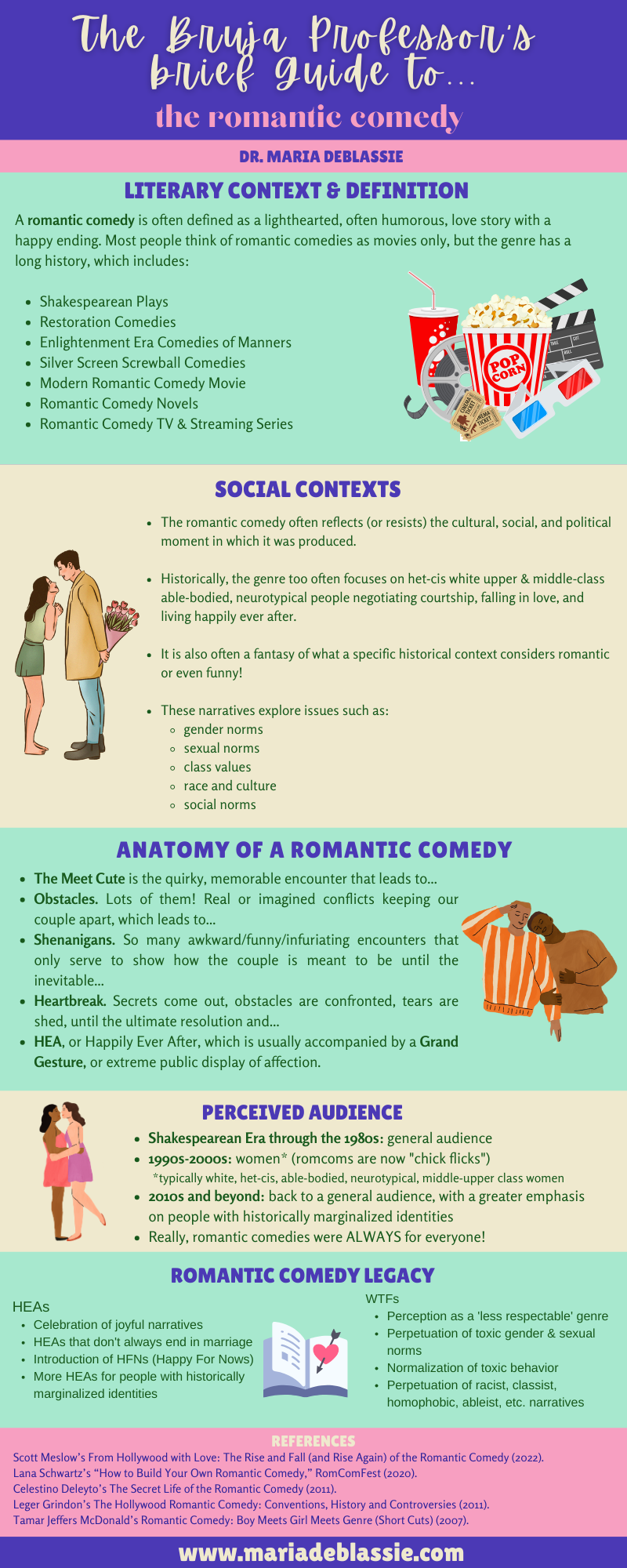Okay, I admit it. There was once a time in high school when I desperately tried to be Not Like Other Girls. That meant rejecting anything normal teens would enjoy, including the teen rom-com. I was Cool. I was Sophisticated. I only consumed Deep Media.
Tragic, I know!
But the truth was, romantic comedies had me at “hola.” I just didn’t want to admit it…until one day, I cared less about being Not Like Other Girls and more about enjoying myself. I owe a lot of this to When Harry Met Sally, which, when I saw it in my late teens, was a revelation. The protagonists were adults doing adult things and talking about adult stuff and looking cool—well, 80s cool—while living against the sophisticated backdrop of New York City.
I know the film hasn’t aged well for some people, a shocking fact I learned while participating in the annual #RomComBracket on Instagram and the slowly dying bird app. But for me, it was the first movie that got me into the romantic comedy and made me realize that while I rejected teen romcoms, I’d been actually watching the genre for a long time in the form of classic silver screen screwball comedies and indie films. I’d also been reading romantic comedies in classic literature and “chick lit.” It’s just that When Harry Met Sally loosened something in my psyche so that I could whole-heartedly enjoy the genre without censure.
Honestly? The movies didn’t even have to be good for me to enjoy them—they still don’t! My sisters and I had a running game in graduate school to see what was the worst or most BANANAS romcom we could find. Sometimes, it was the worst movies that helped me the most emotionally as I dealt with the trauma of grad school. That tradition with my sisters has steadily transformed into relishing the terrible delights of bad holiday rom-coms. There is something deeply soothing about laughing at the tropes, the problems, and the over-the-top cheese of it all.
That’s the beauty of the genre: It’s complex. The stories can be hopeful and inspiring or cringe-y and terrifying. They can be sexy and fun or awkward and obnoxious…just like dating in the real world. Most importantly, they can tell us a lot about what mainstream culture thinks is romantic, funny, or normal. Quite often, those norms aren’t what individual people think are romantic, funny, or healthy, which makes the genre a great vehicle for talking about real-world issues surrounding love and dating.
Fun fact: Romantic Comedies have been around for a long time. Like waaaaaayyy back. I’m talking OLDEN DAYS. Shakespearean times, y’all. And they’re not just movies or plays! We have romance novels and television and streaming series…and other mediums.
The basic definition of a romantic comedy is a lighthearted, often funny, story that focuses on love and ends happily. It should come as no surprise that the genre is having a resurgence given the trauma of the pandemic, the popularity of streaming services that just seem built for popcorn movie fun, and the burnout many feel when looking at yet another reboot, franchise, or big blockbuster movie. Whatever happened to a charming story about two people falling in love?
And, because this is The Bruja Professor, we have to acknowledge the gentle magic of a good rom-com, the way it softens the world and soothes the soul. When done well, these stories offer hope and the promise that something as ephemeral as true love is, in fact, possible and that our emotional, personal, and romantic lives are just as important as getting that good job or buying that dream house. They’re a reminder, when life gets hard that we deserve the good things in life, not just a continuous cycle of plot twists. And, they’re the promise that magic is just around the corner in the form of a Meet Cute, synchronous happening, or an unexpected something that offers us a life of pleasure, joy, and love. Isn’t that the very promise that keeps us going back to these stories? To paraphrase Iris in The Holiday, many of us are looking for corny in our lives…and there’s nothing wrong with that.
It’s a simple thing: A story about two people falling in love and living Happily Ever After. But it is also complex when we look at how this narrative shapes our concepts of love, romance, desire, and happiness…and who gets to be centered in these happy, joyful stories. If you’re looking to get a better sense of how to talk about romantic comedies and their historical and social context, check out my infographic below. May it inspire many a fun conversation as you dive into your next romantic comedy with friends. Just don’t forget the popcorn!
The Bruja Professor, a witchy take on literature, the occult & pop culture, is the scholarly sister to Enchantment Learning & Living, an inspirational blog celebrating life’s simple pleasures, everyday mysticism, and delectable recipes that are guaranteed to stir the kitchen witch in you.
If you enjoyed what you just read and believe that stories are magic & true magic is in the everyday…or your next good read, subscribe to my newsletter below for regular doses of enchantment.
Want even more inspiration? Follow me on Instagram, Facebook, Pinterest, and Twitter. Here’s to a magical life!
